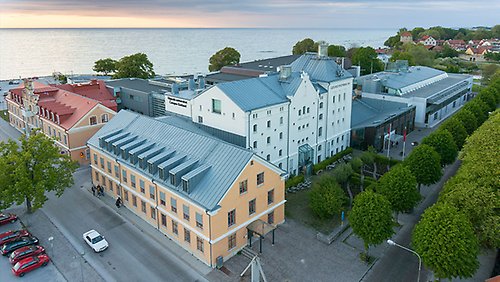Bachelor's Programme in Sustainable Development in Industrial Engineering
180 credits

Would you like to help develop a more sustainable industrial sector? Do you enjoy leading others, and do you want to be part of shaping the business world of the future? Then the Bachelor's Programme in Sustainable Development in Industrial Engineering is the choice for you. During the programme, you will learn about digitalisation, change management, and sustainable development in close cooperation with potential future employers.
Autumn 2023 Autumn 2023, Visby, 100%, On-campus, English
- Location
- Visby
- Pace of study
- 100%
- Teaching form
- On-campus
- Instructional time
- Daytime
- Start date
- 28 August 2023
- Language of instruction
- English
- Entry requirements
-
General entry requirements for first-cycle (Bachelor's level) studies in Sweden. Also required is:
- intermediate level physics (equivalent of Swedish course Physics 2);
- basic level chemistry (equivalent of Swedish course Chemistry 1); and
- advanced level mathematics (equivalent of Swedish course Mathematics 3c).
Proficiency in English equivalent to the Swedish upper secondary course English 6. This requirement can be met either by achieving the required score on an internationally recognised test, or by previous upper secondary or university studies in some countries. Detailed instructions on how to provide evidence of your English proficiency are available at universityadmissions.se.
- Selection
-
Students are selected based on:
- their completed upper secondary (high school) grades (66%)
- Swedish Scholastic Aptitude Test (34%)
Students who have completed their upper secondary (high school) studies outside of Sweden are selected based on their upper secondary grades. Students who have completed their upper secondary studies and have taken the Swedish Scholastic Aptitude Test (only available in Swedish) are selected based on their upper secondary grades and their Scholastic Aptitude Test results.
Tuition fee-paying students and non-paying students are admitted on the same grounds but in different selection groups.
- Fees
-
If you are not a citizen of a European Union (EU) or European Economic Area (EEA) country, or Switzerland, you are required to pay application and tuition fees.
- First tuition fee instalment: SEK 65,000
- Total tuition fee: SEK 390,000
- Application deadline
- 16 January 2023
- Application code
- UU-K1557
- Additional information
-
Read more about Bachelor's level entry requirements and the application procedure.
Autumn 2024 Autumn 2024, Visby, 100%, On-campus, English
- Location
- Visby
- Pace of study
- 100%
- Teaching form
- On-campus
- Instructional time
- Daytime
- Start date
- 2 September 2024
- Language of instruction
- English
- Entry requirements
-
General entry requirements for first-cycle (Bachelor's level) studies in Sweden. Also required is:
- intermediate level physics (equivalent of Swedish course Physics 2);
- basic level chemistry (equivalent of Swedish course Chemistry 1); and
- advanced level mathematics (equivalent of Swedish course Mathematics 3c).
Proficiency in English equivalent to the Swedish upper secondary course English 6. This requirement can be met either by achieving the required score on an internationally recognised test, or by previous upper secondary or university studies in some countries. Detailed instructions on how to provide evidence of your English proficiency are available at universityadmissions.se.
- Selection
-
Students are selected based on:
- their completed upper secondary (high school) grades (66%)
- Swedish Scholastic Aptitude Test (34%)
Students who have completed their upper secondary (high school) studies outside of Sweden are selected based on their upper secondary grades. Students who have completed their upper secondary studies and have taken the Swedish Scholastic Aptitude Test (only available in Swedish) are selected based on their upper secondary grades and their Scholastic Aptitude Test results.
Tuition fee-paying students and non-paying students are admitted on the same grounds but in different selection groups.
- Fees
-
If you are not a citizen of a European Union (EU) or European Economic Area (EEA) country, or Switzerland, you are required to pay application and tuition fees.
- First tuition fee instalment: SEK 65,000
- Total tuition fee: SEK 390,000
- Application deadline
- 15 January 2024
- Application code
- UU-K1557
- Additional information
-
Read more about Bachelor's level entry requirements and the application procedure.
About the programme
The Bachelor's Programme in Sustainable Development in Industrial Engineering gives you a broad knowledge of industrial engineering with an extensive understanding of how sustainability can be used in order to develop industrial production for the future. You will learn to improve various processes related to operations management, logistics and production management. This means that you will be able to create more efficient flows between different activities in industrial companies.
During the programme, you will learn traditional engineering skills in:
- Mathematics
- Computer science
- Logistics
- Production management
- Logic and Automatic Control Systems
- Mechanics.
You will also gain skills in industrial management where you will study project management, industrial economics, leadership and business development. This will develop your ability to effect change. The combination of traditional engineering skills, and knowledge in the field of management and development, creates conditions for you to be part of, and lead the development of a sustainable industry.
Student profile
You are interested in questions regarding sustainable development and want to help industries and businesses improve their production and logistics processes for a better and sustainable future. Besides the technical engineering questions, you are also curious about economic, ecological and social aspects and how these together contribute to a sustainable industry.
You will study together with students from different countries and with different backgrounds. This diversity promotes the education's interdisciplinary and international character. You will find yourself placed in a relatively small class, which enables the effective use of active teaching methods. As a student, you will many times face active teaching methods. Several times during your study, you will work on different projects to solve real business problems in collaboration with companies and organisations.
Degree
The programme leads to the degree of Bachelor of Science in Engineering.
Content
During the programme, you learn to develop and improve processes and systems from the perspective of sustainable development based on economic, ecological and social aspects.
You must understand the entire chain involved in industrial processes. Only then will you be able to optimise it and solve problems that arise. To help you, you have access to methods and tools that focus on digitalisation and sustainable development. During your studies, you learn how to quickly analyse large quantities of data to track the relocation of goods under production, in real-time.
In your third year of the programme, you can study an internship course that is carried out at a suitable business. You participate actively in choosing the company for your placement. Through the internship, you will take part in the company operation and get work experience as an industrial engineer. The course will provide you with valuable contacts for your degree project and your further career.
Courses within the programme
Learning experience
The programme is delivered in a variety of ways that give you high-quality education that optimises your learning experience. The forms of instruction and examination range from standard lectures to components involving student activation such as seminars, laboratory exercises, project work, and study visits. You get to practise working individually and in groups with real cases, real-life tasks and projects from companies. You get a lot of individual feedback, which helps you to independently solve future problems by thinking critically, analytically, and systematically.
The language of instruction and literature is English and you will study together with students from across the world. This interaction will allow you to broaden your intercultural proficiency while training you to work in an international environment and to communicate for a global market.
Study at Campus Gotland
The programme is offered at Campus Gotland in Visby where you will get the best of both worlds: the large university's width and depth within education and research as well as the unique study environment of a smaller campus with a clear focus on sustainability. Here you will be part of a study environment with ample teaching time. Every student is seen and acknowledged, and we have long experience in supporting students' individual learning processes. The study programmes offered at Campus Gotland feature a high degree of collaboration with the local community, in particular with the local community. This gives you valuable experience and contacts for your subsequent working life.
Career
Just like businesses in general, industrial companies are facing structural change that involves taking advantage of the opportunities afforded by digitisation, transitioning to cleaner and greener technologies, and adapting to more efficient use of resources. The pace of change in the area has increased significantly in recent years. There is a great need for engineers to apply a long-term approach that considers the social and ecological aspects of sustainability of ventures in combination with the economic aspects that have traditionally dominated.
After the programme, you will have excellent opportunities for employment as an engineer in several industries. Examples of industries you could work in are:
- Energy
- Materials
- Automotive
- Clothing
- Pharmaceuticals
- Food
As an engineer with skills in industrial engineering and development, you can work in many different contexts. For example, you could work in production with production planning, logistics, or purchasing. You can also work with business development. Your professional role could also include tasks such as project manager or responsibility for sustainability matters in production and development.
If you want to continue your studies after completing your degree, there are several Master's programmes relevant to the field of studies, such as the Master's Programme in Industrial Management and Innovation (120 credits).
Career support
During your time as a student, UU Careers offers support and guidance. You have the opportunity to take part in a variety of activities and events that will prepare you for your future career.
Is this programme right for you?
Read interviews about the programme.

Study in Visby
What is it like studying at Campus Gotland?

Register your interest
Keep updated about the application process.

Contact
- For study counselling, please contact:
- studievagledning-cg@uu.se
- For admissions-related or general information, please contact our applicant support team:
- undergraduate@uu.se
Students
As a student you will find information about your studies in the student gateway.
